The First TKT CAMPUS Asia Online Summer Camp was successfully held from August 17 to 19, 2020. Sponsored by the Korea Advanced Institute of Science and Technology (KAIST) in the Republic of Korea (ROK) and co-organized by the Tokyo Institute of Technology (Tokyo Tech) in Japan and Tsinghua University, the summer camp gathered a total of 25 students from the three universities. It was a completely new approach taken amidst the global spread of COVID-19. The summer camp offered thematic lectures, cultural activities and group presentations, among others, and by effectively using online platforms, it created a new learning model featuring online teacher-student interaction and online inter-student cooperation, serving as a platform for communication and exchanges between students from the three universities.
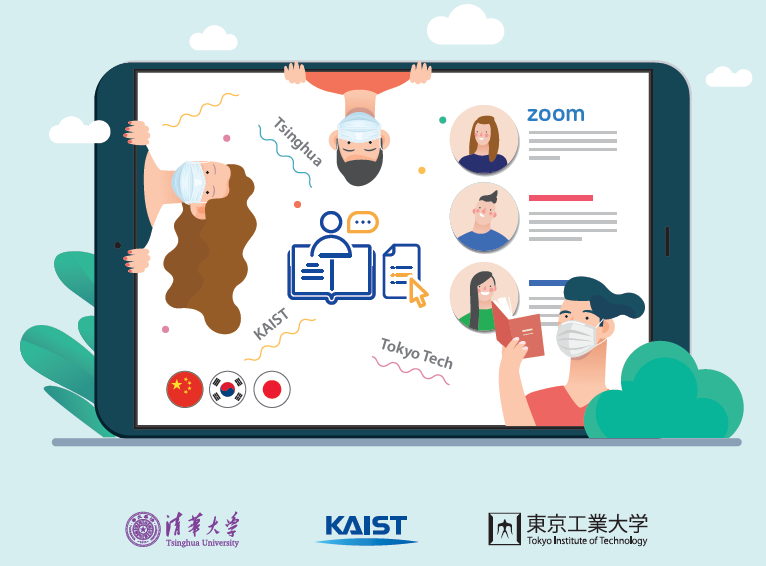
Opening Ceremony
On the morning of August 17, Professor Shin-Hyun KIM from the KAIST moderated the opening ceremony. Professor Masahiko HARA from the Tokyo Tech delivered opening remarks. MENG Bo, Associate Dean of the Office of International Affairs at Tsinghua University, attended the event on behalf of the university.
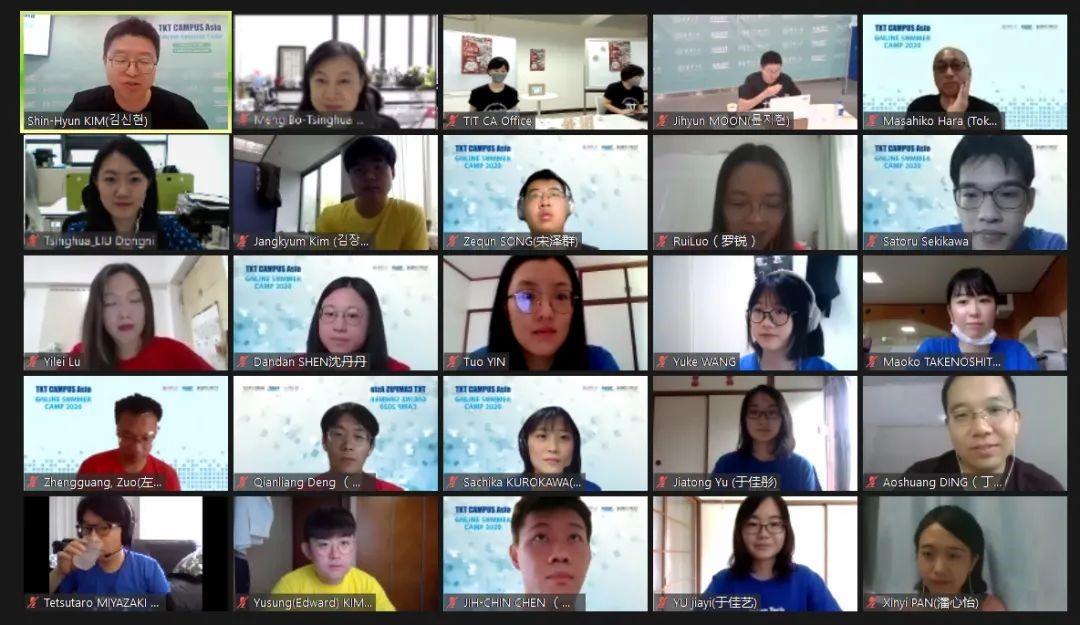
Opening ceremony
Invited Lectures
01 “AI–aided Transportation Policy Decision: An Example in the Pandemic of COVID-19”
Professor LI Meng from the School of Civil Engineering at Tsinghua University gave the first lecture of the summer camp. He remarked that COVID-19 has spread to most countries in the world, posing a serious threat to global public health. It has been proven that non-pharmaceutical interventions (NPIs) along with travel bans are effective tools to contain the pandemic. However, the latter is likely to exert profound negative impacts on the tourism industry, the manufacturing industry, and many other industries, thereby putting regional economies at risk. Professor LI and his partners AN Yunlong and LIN Xi brought forward an artificial intelligence-aided dynamic decision-making model of multi-modal traffic restriction, which describes the influence of cross-city travel on the spread of COVID-19 and on the regional economy. By using deep learning, they introduced an online optimization model for the formulation of travel restriction strategies, in order to minimize the scope of COVID-19 and its influence on the regional economy.
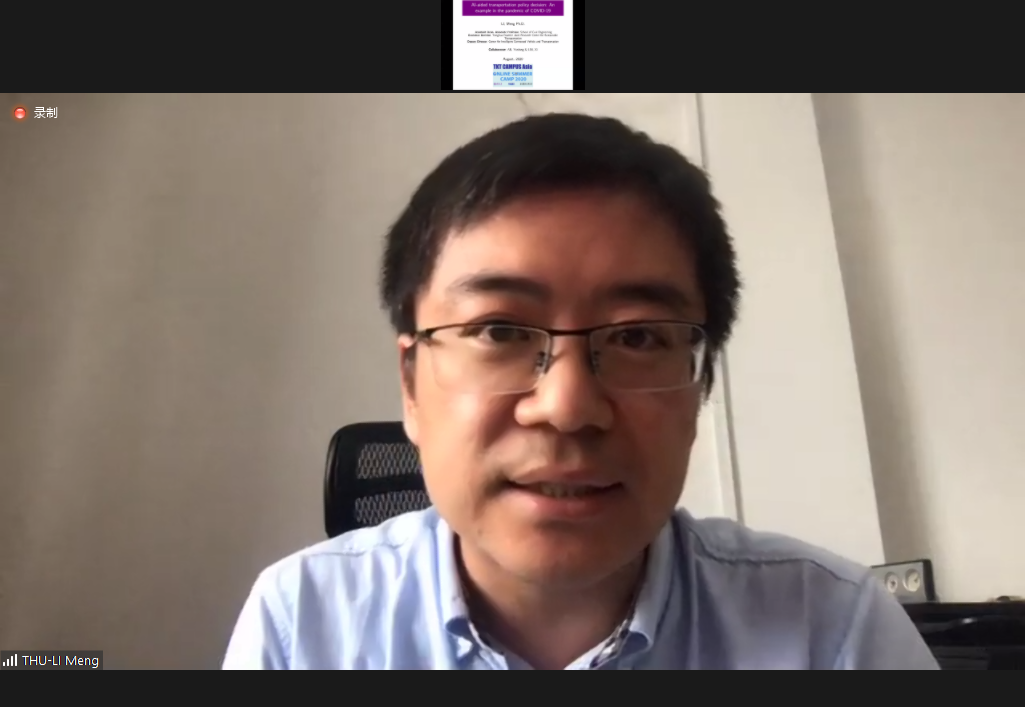
Professor LI Meng gives the online lecture
02 “A Virus Is Changing the World. Survival of the Fittest?”
The second lecture was given by Professor Olaf KARTHAUS from the Department of Applied Chemistry and Bioscience at Chitose Institute of Science and Technology, Japan. Professor KARTHAUS first reviewed the changes taking place in the world in the wake of the severe acute respiratory syndrome (SARS) outbreak and then guided students to think over the impacts of COVID-19 on the economy, environment, public health and medical care. In regard to scientific research, although online seminars can be efficient and convenient, information security is still a concern. Under his guidance, the students engaged in heated discussions on how scientific researchers press ahead with their research despite the pandemic. In the meantime, he suggested that the students slow down their lives, learn to be patient and self-disciplined, and make better use of open online resources to continuously expand their horizons.
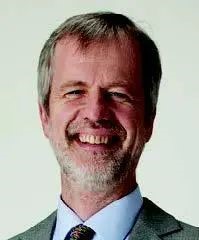
Cultural Activities
This summer camp arranged three courses on cultural experience, including learning the Korean language, making Hanji LED lights with traditional Korean materials, and using Kumiko, a Japanese carpentry technique, to make cup mats. Under the online guidance of Professor KARTHAUS, the students used DIY accessories sent to them in advance by the project team to experience the cultures of different countries.
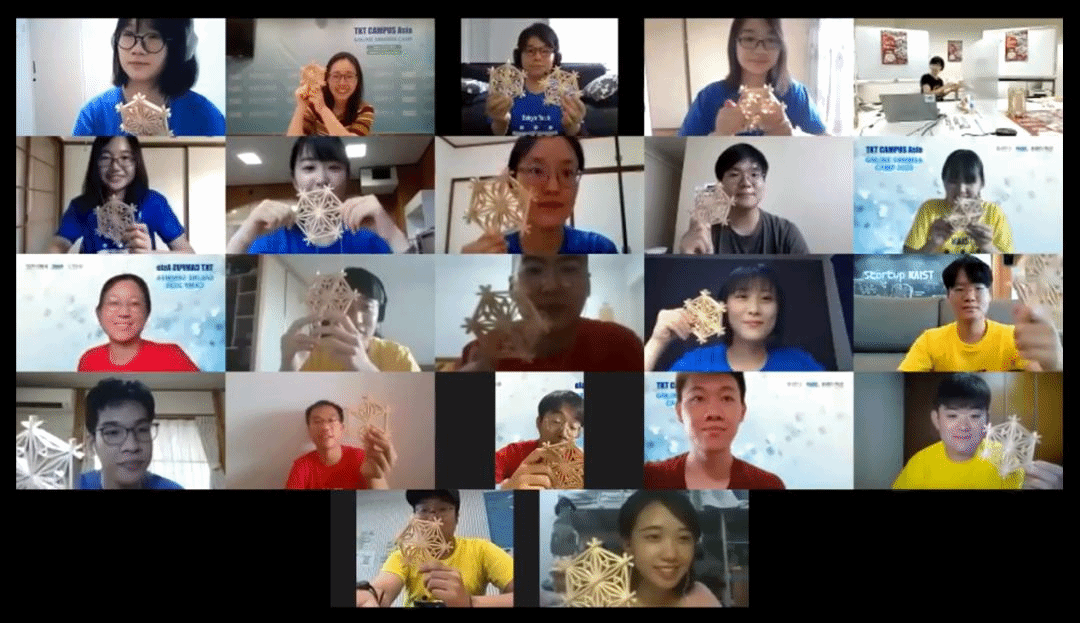
Students learn to make wood craft products with the Japanese Kumiko technique online
Group Presentations
The 25 students involved in this event were divided into five groups, each of which included students from the three universities. They engaged in thematic group discussions and shared their learning outcomes through group presentations. The review team, composed of professors from the three universities, gave scores and comments on the presentations of each group. In combination with peer review, three groups were awarded the first, second and third prizes.
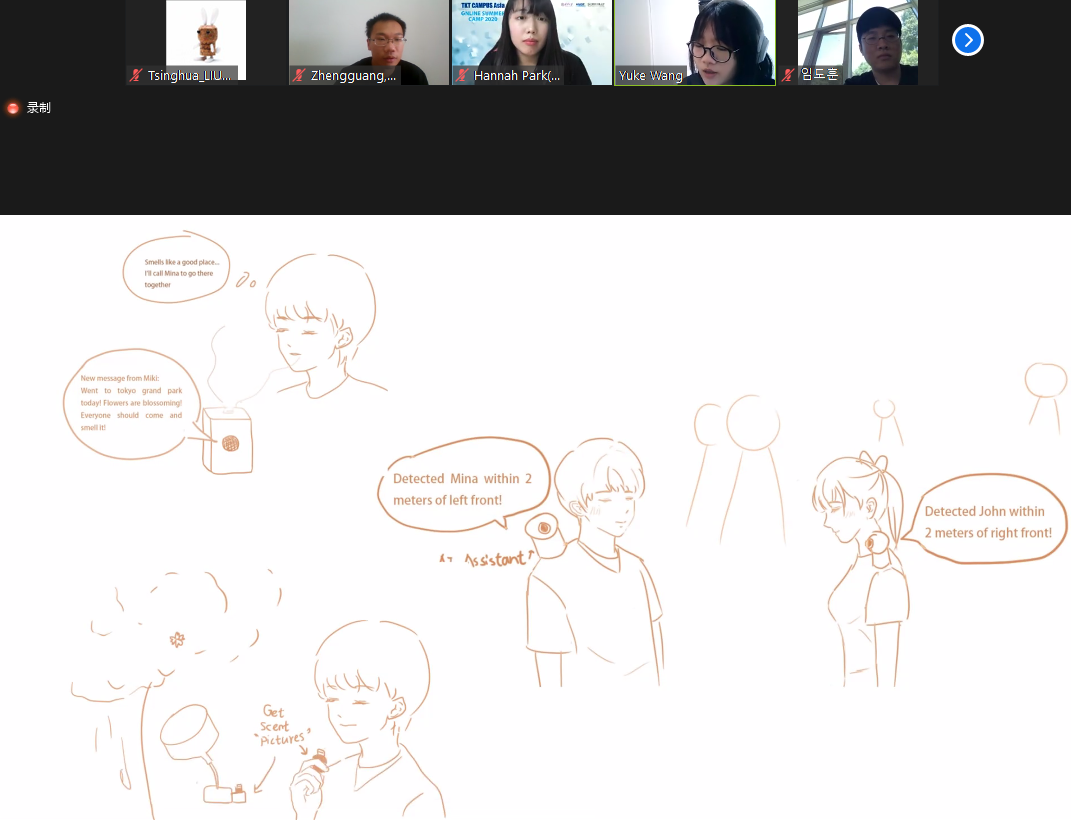
Students give group presentations
Closing Ceremony
On the afternoon of August 19, the First TKT CAMPUS Asia Online Summer Camp came to a fruitful conclusion. XING Xinhui, Professor of the Department of Chemical Engineering at Tsinghua University and university head of the CAMPUS Asia program, delivered closing remarks. The KAIST presented certificates of completion to student representatives, while the rest of the students participated in the closing ceremony via a video link.

Professor XING Xinhui deliver closing remarks
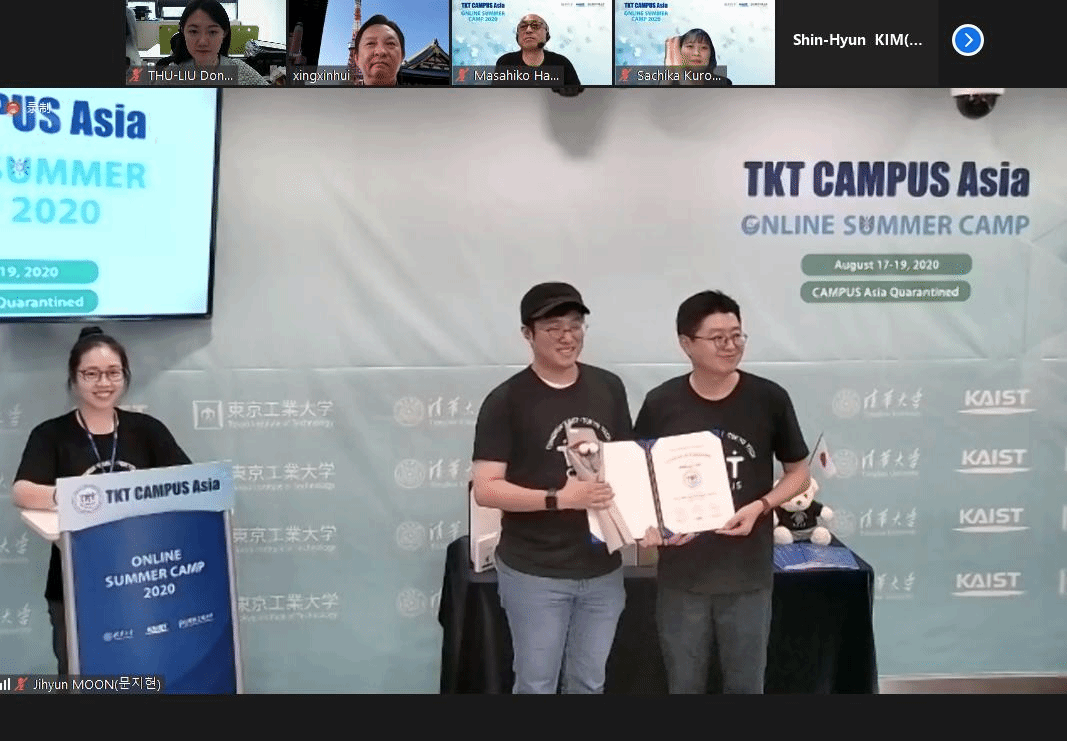
Award certificates of completion online
Student Reflections
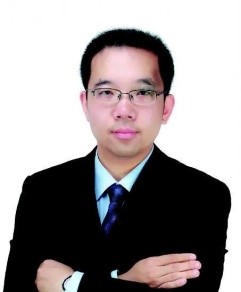 DING Aoshuang: This was the first online summer camp project I have ever attended. At first, I thought all I needed to do was to attend classes. However, when I joined the TKT project, I started to experience inspiring activities and DIY courses, and completed projects with friends from Japan and the ROK online. These have allowed me to gain unique experiences and enjoy making progress in classes. I am glad that I made the right decision to join the TKT online summer camp.
DING Aoshuang: This was the first online summer camp project I have ever attended. At first, I thought all I needed to do was to attend classes. However, when I joined the TKT project, I started to experience inspiring activities and DIY courses, and completed projects with friends from Japan and the ROK online. These have allowed me to gain unique experiences and enjoy making progress in classes. I am glad that I made the right decision to join the TKT online summer camp.
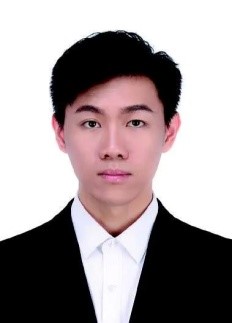 CHEN Rijin: It was my great honor to participate in the TKT project of CAMPUS Asia during my quarantine in Shanghai. Having attended several lectures, I had a deep feeling that COVID-19 has not only changed our way of life but also presented a lot of opportunities and opened up development prospects. All we can do is pursue our goals despite all the challenges and empower our lives through technology. I am sincerely grateful to the project in that it allowed me to meet so many friends from the Tokyo Tech and the KAIST. We talked about different cultural traditions, shared views and stayed up late for our presentations. It was indeed a memorable experience.
CHEN Rijin: It was my great honor to participate in the TKT project of CAMPUS Asia during my quarantine in Shanghai. Having attended several lectures, I had a deep feeling that COVID-19 has not only changed our way of life but also presented a lot of opportunities and opened up development prospects. All we can do is pursue our goals despite all the challenges and empower our lives through technology. I am sincerely grateful to the project in that it allowed me to meet so many friends from the Tokyo Tech and the KAIST. We talked about different cultural traditions, shared views and stayed up late for our presentations. It was indeed a memorable experience.
CAMPUS Asia
CAMPUS Asia, fully known as the Collective Action of Mobility Program of University Students in Asia, is a program led by the governments of China, Japan and the ROK involving key universities from the three countries. The program strives to promote exchanges and interactions among university students from China, Japan and the ROK to contribute to cultivating the next generation of talented individuals in Asia. Built on an educational exchange plan agreed upon by the three countries from the top down, the program represents a practical action taken to deepen mutual understanding among the three countries and push forward future-oriented higher education cooperation.
In 2011, the Ministry of Education of China announced the review results of CAMPUS Asia’s pilot program under the auspices of the three countries. Tsinghua University was approved to launch the TKT CAMPUS Asia project, in conjunction with the KAIST and the Tokyo Tech. Since its debut in 2012, Tsinghua University has sent a total of 191 students to the two partner universities in Japan and the ROK as exchange students.
